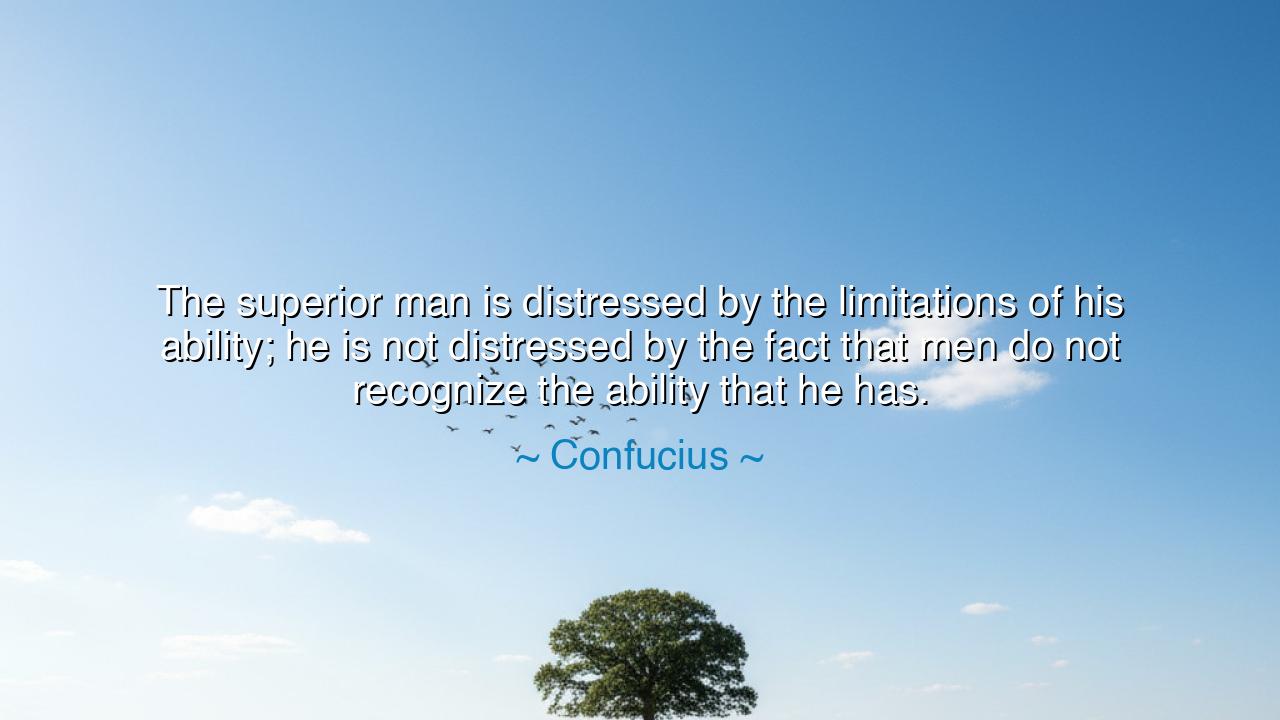
The superior man is distressed by the limitations of his ability;
The superior man is distressed by the limitations of his ability; he is not distressed by the fact that men do not recognize the ability that he has.






The words of Confucius, “The superior man is distressed by the limitations of his ability; he is not distressed by the fact that men do not recognize the ability that he has,” resound with the timeless dignity of self-mastery and humility. Spoken more than two thousand years ago, this teaching belongs to the ancient heart of Chinese philosophy, yet its truth transcends all ages and nations. It speaks to the nature of true greatness, to the inner balance of the wise and virtuous man—one who seeks excellence not for praise, but for the quiet perfection of his own soul.
In the thought of Confucius, the superior man—the Junzi—is not defined by rank, wealth, or reputation, but by character, discipline, and sincerity. The inferior man, by contrast, is swayed by vanity and resentment. The superior man looks inward to improve himself; the inferior man looks outward to be admired. Thus, when Confucius says that the noble soul is distressed only by his own limitations, he means that the true mark of wisdom is self-accountability, not the craving for recognition. The wise man knows that his worth lies in the work of refining himself, not in the applause of the crowd.
This teaching was born in an age of turmoil, when the kingdoms of ancient China were divided by war and ambition. Many scholars sought favor in royal courts, hoping to have their talents acknowledged. Confucius himself endured rejection—his counsel was often ignored, his reforms unheeded. Yet rather than despair, he turned inward, continuing his lifelong pursuit of virtue and knowledge. He once said, “Do not be concerned that others do not recognize you. Be concerned that you do not recognize others.” This is the spirit of his quote: the superior man measures his worth by effort, not by fame.
History offers many mirrors to this truth. Consider the story of Leonardo da Vinci, whose genius was not fully understood in his own time. He painted, invented, and studied tirelessly, often in obscurity. Yet his journals reveal no bitterness toward those who overlooked him—only a constant striving to perfect his craft. Leonardo, like the Junzi, was more troubled by the limits of his skill than by the blindness of others. His immortality came not from seeking recognition, but from devotion to mastery. The world, in its own time, came to see what he had already seen within himself.
To be distressed by one’s limitations is not despair—it is the noble pain of aspiration. It is the cry of the spirit that knows it was made for something higher and feels the distance still to be traveled. Such pain is creative, not corrosive; it pushes the soul to grow. But to be distressed by lack of recognition is to hand one’s worth to the judgment of others. The superior man refuses this bondage. He lives by an inner compass, anchored in virtue and purpose, not in the fleeting winds of reputation.
The lesson of Confucius is therefore a call to inner sovereignty. Let your concern be not who sees your light, but how brightly it burns. The world’s blindness cannot dim true brilliance; it can only delay its revelation. The wise do not rush the harvest—they tend the soil and trust time. Recognition may come or it may not, but integrity, once cultivated, endures forever.
So let this teaching be passed down: seek excellence, not admiration. When you fail, let it trouble you only because you can still grow; when you succeed, let it humble you, for perfection lies always ahead. The applause of men fades like an echo in the wind, but the quiet satisfaction of a disciplined heart is eternal. As Confucius teaches, the superior man’s struggle is not with the blindness of others, but with his own unfinished greatness.






AAdministratorAdministrator
Welcome, honored guests. Please leave a comment, we will respond soon